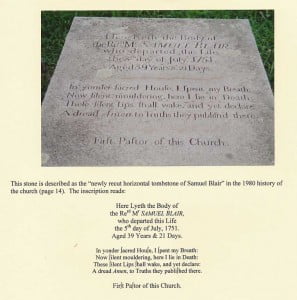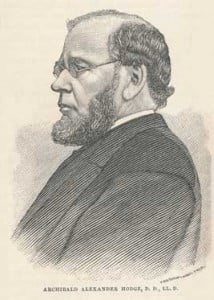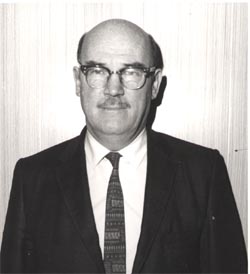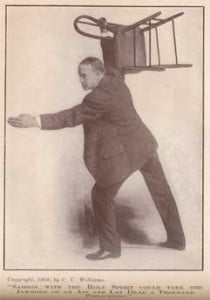“Why Doesn’t God DO SOMETHING About this War?”
In Harold Samuel Laird on 12/09/2012 at 14:17
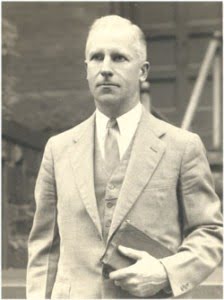 For our Sunday sermon, and with an eye to Veteran’s Day tomorrow, we present the following sermon, preached by the Rev. Harold Samuel Laird [1891-1987] at some point over the summer of 1942, about a year after the United States had entered World War II. He had the previous Sunday preached a sermon titled “What Should the Christian’s Attitude Be Toward This War?” The second sermon in this short series, reproduced here below, takes Matthew 24 as its text.
For our Sunday sermon, and with an eye to Veteran’s Day tomorrow, we present the following sermon, preached by the Rev. Harold Samuel Laird [1891-1987] at some point over the summer of 1942, about a year after the United States had entered World War II. He had the previous Sunday preached a sermon titled “What Should the Christian’s Attitude Be Toward This War?” The second sermon in this short series, reproduced here below, takes Matthew 24 as its text.
Rev. Laird was a pastor in Wilmington, Delaware, and a member of the Bible Presbyterian denomination. He taught for many years at Faith Theological Seminary. A man of high character, he was always spoken of with the greatest regard.
Why Doesn’t God DO SOMETHING About this War?
There are two questions touching the present war with which by this time most of us are quite familiar, for they have been repeatedly asked. They are: first, What should the Christian’s attitude be toward this war? and second, Why doesn’t God do something about this war?
While the first of these two questions arises for the most part in the minds of Christians, many of whom honestly desire to know and do the will of God in the present emergency, the second comes not so much from Christians, who are more or less acquainted with the revelation which God has given of Himself in the Holy Scriptures, but rather from those who are wholly ignorant of that revelation.
In the light of this fact, it is not the least bit strange that we hear the question of our theme so often in these days. Though the Bible is now, as it ever has been, the best seller among all the books in the world, never in its history have the great masses of the people who possess it been more ignorant of its contents than they are in this very day. This is no doubt due very largely to the fact that the Church itself has failed miserably in its God-given mission to make known to the world the message of the Word of Cod. Instead, it has been giving another message—the message of human philosophy, or the “wisdom of this world,” which, according to the greatest philosopher the world has ever seen, is “foolishness with God.”
Therefore, when one puts to me this question, earnestly and honestly, I am absolutely persuaded that I have the answer that will perfectly satisfy his soul, provided he is willing to accept the testimony of this Book, as a supernatural revelation from God concerning Himself and His immutable purposes for this, His sin-cursed creation.
You ask me, “Why doesn’t God do something about this war?” 1 answer by means of three positive statements: first, God has already done something about this war, second, God is now doing something about this war; and third, God will yet do something about all wars.
I.—God HAS ALREADY DONE Something About This War.
 I refer, of course, to that which God did two thousand years ago, when He saw the wickedness of man, that it was great in the earth. Once before, approximately three thousand years prior to that, Moses tells us in the Book of Genesis, the book of beginnings, that God saw the same sight, “and that every imagination of the thoughts of his (man’s) heart was only evil continually.” Moses adds that “it repented the Lord that He had made man on the earth, and it grieved Him at His heart. And the Lord said, 1 will destroy man whom I have created from the face of the earth’’ (Gen. 6:5-7). And we have it both from the record of Sacred History and from the traditional history of practically every heathen race, that in due course of time God did what He said He would do, and, save for one man and his family, who found grace in the eyes of the Lord, the whole sinful human race was destroyed by the flood.
I refer, of course, to that which God did two thousand years ago, when He saw the wickedness of man, that it was great in the earth. Once before, approximately three thousand years prior to that, Moses tells us in the Book of Genesis, the book of beginnings, that God saw the same sight, “and that every imagination of the thoughts of his (man’s) heart was only evil continually.” Moses adds that “it repented the Lord that He had made man on the earth, and it grieved Him at His heart. And the Lord said, 1 will destroy man whom I have created from the face of the earth’’ (Gen. 6:5-7). And we have it both from the record of Sacred History and from the traditional history of practically every heathen race, that in due course of time God did what He said He would do, and, save for one man and his family, who found grace in the eyes of the Lord, the whole sinful human race was destroyed by the flood.
But it will be remembered that following that destruction, God gave to Noah a promise that never again would He thus deal with man. As a pledge of His promise, He set His bow in the sky. Hence it was that three thousand years later, when once again God looked upon the wickedness of man, instead of destroying him, He exercised mercy, and sought to save him from his wickedness and selfishness by sending into the world His only begotten Son, our Lord and Saviour Jesus Christ. God purposed that through Him, and His great sacrifice on the cross for sin, the wicked heart of man might be changed.
We understand, of course, that the heart of the Gospel is in John 3:16, where we read that “God so loved the world, that He gave His only begotten Son, that whosoever believeth in Him should not perish, but have everlasting life.” But we also know that this is by no means the whole of the Gospel. When God sent His only begotten Son into the world, He did so not only that man might be saved from hell and secured unto heaven, but that his very nature, which the Word of God declares is “deceitful above all things and desperately wicked,” might be changed. To use the words of the Lord Jesus, God gave His Son that man might be “born again,” and thereby receive a new nature, a nature that LOVES instead of HATES, that GIVES instead of TAKES, that seeks another’s good, and not his own. “From whence come wars and fightings among you? come they not hence, even of your lusts that war in your members?” (James 4:1). Whence come these lusts that war in our members? Come they not hence, even of our Adamic fallen natures, from the sinfulness of which God sought to deliver men by the work of His only begotten Son on the cross?
That this was a part of the purpose of God in sending His Son Jesus Christ into the world is clear from the words of Christ Himself, “I am come that they might have life, and that they might have it more abundantly” (John 10:10). But we also know from the record of the Gospels that man rejected the offer of the Lord, crying, “Away with Him; we will not have this Man to reign over us.” And from that day to this, men have continued to reject God’s offer in Jesus Christ, the only remedy in this dispensation for the elimination of war. As long as individuals will strive with one another, due to unregenerate natures, nation may be expected to war against nation, and kingdom against kingdom, even as Christ Himself has said (Matt. 24:7).
II.—God IS NOW DOING Something About This War.
There are those who tell us that God has nothing at all to do with this war. Let me say just this concerning such people—they are absolutely ignorant of the revelation God has given us of Himself in His Holy Word. Those who know and believe the Bible will agree that God has everything to do with this war.
Certainly, if the Bible teaches anything about God it is that He is SOVEREIGN God. What is meant by that? The best explanation of God’s sovereignty can be given by re-calling to your minds a bit of Old Testament History. I refer to Daniel’s historic record of Nebuchadnezzar. He was the ruler of the world’s first Gentile world-empire. God raised him up and employed him as His own tool for the chastening of His people Israel; and when God was through using him as His tool, God dealt with him.
The account of this dealing is found in the fourth chapter of Daniel, where we have the record of Nebuchadnezzar’s dream of the great tree, reaching unto heaven, which was hewn down and destroyed, leaving only the stump of its roots in the earth. The king, remembering Daniel’s ability to interpret dreams, summoned him, that he might reveal the meaning of this dream. The narrative gives us the words of Daniel as he speaks to the heathen king: “This is the interpretation, O king, and this is the decree of the most High, which is come upon my lord the king: that they shall drive thee from men, and thy dwelling shall be with the beasts of the field, and they shall make thee to eat grass as oxen, and they shall wet thee with the dew of heaven, and seven times shall pass over thee, till thou know that the most High ruleth in the kingdom of men, and giveth it to whomsoever He will” (v. 24, 25). In due time, as the record says, “All this came upon the king Nebuchadnezzar. At the end of twelve months he walked in the palace of the kingdom of Babylon. The king spake, and said, Is not this great Babylon, that I have built for the house of the kingdom by the might of my power, and for the honour of my majesty?” (v. 28- 30). Continuing the account, we are told that “While the word was in the king’s mouth, there fell a voice from heaven, saying, O king Nebuchadnezzar, to thee it is spoken; The kingdom is departed from thee” (v. 31). Then we have the story of how his own subjects drove him from his palace to the wilderness, where, in accordance with the prediction of Daniel, for seven years by reason of his insanity, he “did eat grass as oxen, and his body was wet with the dew of heaven, till his hairs were grown like eagles’ feathers, and his nails like birds’ claws” (v. 33). Finally, the record declares that God restored to Nebuchadnezzar his reason, and then it was that he bore testimony to the sovereignty of God—the greatest testimony found anywhere. Nebuchadnezzar himself tells us how he lifted up his eyes to heaven as his understanding returned to him, and blessed the most High, and “praised and honoured Him that liveth for ever, whose dominion is an everlasting dominion, and His kingdom is from generation to generation” (v. 34) . Then follows his testimony to God’s sovereignty in the words, “He doeth according to His will in the army of heaven, and among the inhabitants of the earth: and none can stay His hand, or say unto Him, What doest thou?” (v. 35).
I would also remind you of God’s Word concerning others with whom He thus dealt, and His own testimony as to His sovereign power over them. One of the clearest examples is the account of the word of the Lord against Sennacherib, king of Assyria, on the occasion of his blasphemous message, delivered to Hezekiah, king of Judah (II Kings 19: 22-28). Thus spake the Lord to Sennacherib, “Whom hast thou reproached and blasphemed? and against whom hast thou exalted thy voice, and lifted up thine eyes on high? even against the Holy One of Israel. By thy messengers thou hast reproached the Lord, and hast said, With the multitude of my chariots I am come up to the height of the mountains, to the sides of Lebanon, and will cut down the tall cedar trees thereof, and the choice fir trees thereof; and I will enter into the lodgings of His borders, and into the forest of His Carmel. I have digged and drunk strange waters, and with the sole of my feet have I dried up all the rivers of besieged places. Hast thou (Sennacherib) not heard long ago how I have done it, and of ancient times that I have formed it? Now have I brought it to pass, that thou (Sennacherib) shouldst be to lay waste fenced cities into ruinous heaps. Therefore their inhabitants were of small power, they were dismayed and confounded; they were as the grass of the field, and as the green herb, as the grass on the house tops, and as corn blasted before it be grown up. But I know thy abode, and thy going out, and thy coming in, and thy rage against me. Because thy rage against me and thy tumult is come up into mine ears, therefore I will put my hook in thy nose, and my bridle in thy lips, and I will turn thee back by the way which thou earnest.” Thus spake our Sovereign God to a boastful pagan king.
Now I ask, has God changed? Has the most High ceased to be Sovereign? Is He no longer the Ruler of nations? Is it no longer true that the NATIONS ARE AS A DROP IN A BUCKET before Him? And that the inhabitants thereof are as grasshoppers in His sight? Is God helpless now to do “according to His will in the army of heaven, and among the inhabitants of the earth?” My answer to all these questions is this: What He did then, He does now, because He is “the same yesterday, and today, and forever” (Heb. 13:8).
Just because God does not do what YOU think He ought to do is no proof that He is doing NOTHING. There is one thing He is doing now about this war. He is working out His immutable purposes respecting His chosen people Israel. It will be remembered that at the trial of Jesus before Pilate, the governor asked Him, saying, “Art thou the King of the Jews?” To which Jesus simply replied, “Thou sayest” (Matt. 27:11). A little later, in his determined effort to be freed from the responsibility of condemning the Lord, Pilate sought to secure His release by asking the Jews, “Shall I crucify your King?” To which they readily replied, “We have no king but Caesar,” adding, “Away with Him, crucify Him” (John 19:15). “When Pilate saw that he could prevail nothing, but that rather a tumult was made, he took water, and washed his hands before the multitude, saying, I am innocent of the blood of this just person: see ye to it. Then answered all the people, and said, “His blood be on us, and on our children” (Matt. 27:24, 25). It was but a short time thereafter, that as Jesus made His way to the hill called Calvary, bearing upon His bleeding back the heavy cross, He said to the Jewish women who stood by watching Him, and weeping over the sight they beheld, “Weep not for me, but weep for yourselves, and for your children” (Luke 23:28).
There is also something else that He is doing about this war. He is dealing with the so-called Christian nations. I refer to Great Britain, and especially to the United States of America. We stood by and looked on while Italy conquered Ethiopia, and Japan over-ran China, even aiding Japan to the extent of sending oil and materials which were used in this war of aggression. God is now using Japan and Germany as He once used Nebuchadnezzar and Sennacherib. Let us remember that God deals with nations as He deals with individuals. The only difference is that because individuals live forever, He sometimes deals with them only in the world to come. Because nations exist only for the time being, He must chastise them here and now.
III.—God WILL YET DO Something About ALL War.
Let me say at once that until God does do what He intends to do, man is utterly helpless to do all that he has ever boasted he would do. We know that even now men are talking about the peace after this war. They are scheming and planning to the end that when this war is over we may have “permanent” peace. When will the world ever learn that man can never bring about a permanent peace! One would think that it would have learned this by now.
Well do I remember, as do many of you, how just before the last war men everywhere were boasting of the progress that had been made by the human race as a result of the so-called natural law of evolution. Everywhere the cry was heard that the world was getting better and better. Some were so daring as to predict that wars were a thing of the past, that they were absolutely impossible, that men could 110 longer take the lives of their brothers in organized conflict. Then suddenly in 1914 the world was plunged into the greatest war of all time. How these humanistic philosophers frantically sought for an explanation of it all! Finally, one, a bit wiser than the rest, had the happy thought that it was the LAST war, and was being fought to put an end forever to all war. What a wise notion that was!
You will also recall that it was from the close of the last war until within only a short time ago that we saw the greatest effort ever put forth by man for a permanent peace. The Federal Council of Churches of Christ in America was so determined that there should be 110 more war that they urged what they called “peace strikes” in the event of war. Some of the larger denominations endeavored to get their ministers to promise to have nothing whatever to do with a war, should it come, not even to take advantage of the opportunity to act as chaplains in the armed forces. These people were determined that there should be no more war. To what did all their determination amount? They even sought to do away with war by urging our own nation to disarm, by sinking some of its largest vessels and refusing to manufacture munitions of war. It would be just as sensible for the city of Wilmington to scrap its police force, with the thought that by so doing, Philadelphia would follow its example, and possibly Chicago also. Can you picture Chicago without a police force?
But, in spite of it all, war came, and when it did, it came with a vengeance. It has already put the last war in the shade. Sometime ago I listened to a program on the radio in which the speaker was commenting on the caption “Remember Pearl Harbor.” I found myself in perfect accord with him when he said, “True, we ought to remember Pearl Harbor, and we should do so primarily for one reason, and that is that never again should we heed the pleas of those who urge the nation to scrap its Army and Navy, and trust the other nations to follow its example.”
Do you know why peace is impossible, in spite of the efforts of men to bring it about? The explanation is found in God’s revelation concerning the heart of man. It is “deceitful above all things and desperately wicked,” as it ever has been. Man’s heart needs to be changed. Jesus Christ is the only One who can change it.
Because men continue to reject Him, their hearts will never be changed. Jesus Christ knew this when He spoke the words of our Scripture lesson, “Ye shall hear of wars and rumours of wars. . . . For nation shall rise against nation, and kingdom against kingdom . , . ” (Matt. 24:6, 7). However, the Word of God is clear in this, that in God’s own time the Lord Jesus will return again to set up His own Kingdom, to rule and reign with a rod of iron, and thereby establish permanent peace. This promise we have in the prophecy of Isaiah, where we read, “The word that Isaiah the son of Amos saw concerning Judah and Jerusalem. And it shall come to pass in the last days, that the mountain of the Lord’s house shall be established in the top of the mountains, and shall be exalted above the hills, and all nations shall flow unto it. And many people shall go and say, Come ye, and let us go up to the mountain of the Lord, to the house of the God of Jacob; and He will teach us of His ways, and we will walk in His paths; for out of Zion shall go forth the law, and the word of the Lord from Jerusalem. And He shall judge among the nations, and shall rebuke many people: and they shall beat their swords into plowshares, and their spears into pruninghooks: nation shall not lift up sword against nation, neither shall they learn war any more” (Isa. 2:1 -4).
“He maketh wars to cease unto the end of the earth; He breaketh the bow, and cutteth the spear in sunder; We burneth the chariot in the fire” (Psalm 46:9). Little wonder that the Apostle John prayed as he did in the conclusion of his Revelation, “Even so, come, Lord Jesus.”

